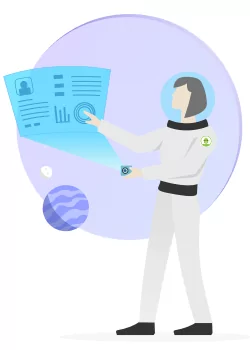Gap years can be helpful in your life, but hard to explain on a resume. Here’s how you can create a more effective resume discussion of your gap year.

Tips for Discussing Your Gap Year
A gap year is a period of time in which you’re not working or going to school. You might take a gap year between high school and college, for example, or between college and finding a full-time job. For some people, gap years may include time taken to care for family members or to relocate. When you’re writing a resume, your gap year might seem like a negative, as it can create a gap in your resume that’s hard to explain. Here’s what you need to know about talking about your gap year.

Do You Really Need to Discuss Your Gap Year?
The first question many job seekers have about gap years is whether they need to discuss one at all. If your gap “year” is within the last 10 years and longer than a few months, your hiring manager will notice. Most employers don’t need explanations of gaps less than three months, but if it’s longer than this, your hiring manager may have questions. And not mentioning such gaps at all may seem like you’re trying to hide them.
4 Top Tips for Discussing a Gap Year
So how do you effectively explain gap years on your resume? Here’s our top tips.
1. Use a different resume format.
One of the best ways to make a gap year stand out less is to switch up the resume format you’re using. If you’re using a chronological resume format, it makes it immediately obvious that you weren’t employed during a specific time period, which can raise questions. Instead, consider the functional format, which emphasizes skills and important achievements, or the combination format, which provides a combination of the two formats while highlighting skills.
2. Include your gap year under your experience section.
During your gap year, you may have worked, taught, or volunteered, rather than just taken time off. Through this, you may have gained valuable experience and learned new skills, including soft skills which are transferable across many professions, and hard skills, which are more specific technical skills and knowledge. Your gap year may work perfectly for your experience section, rather than being an actual drawback.
3. Add a breakout section in your resume for your gap year.
If your gap year experiences don’t line up with many of your other jobs in your experience section, you may want to consider putting them in their own section. For example, say that most of your jobs are in the construction industry, but for a year, you went to an underfunded reservation in the United States and helped them build a more robust healthcare system. You may want to create a special section in your resume entitled, “Volunteer work” or “Charity work” where you can include this.
4. Include accomplishments throughout your resume.
Your accomplishments should not just be included where you would put your gap year. During your gap year, you may have learned new skills, such as learning a new language or budgeting. These skills can go in your Skills section, and your Summary section can also benefit from some of the skills and accomplishments that you went through in your gap year.
Addressing a Gap Year in an Interview
So, you’ve made it through the resume portion of the job application and you’re at the interview. You should always assume that a hiring manager will ask about your gap year at the interview, with questions such as these:
- Why did you take time off?
- What was the most important skill you learned during your gap year?
- Would you ever take another gap year?
- What would you do differently in your gap year if you could do it again?
- Do you think a gap year is a good idea for other job seekers?
Remember, in answering any of these questions, you want to present the positives of your gap year. In answering the question, “What would you do differently?” for example, you’ll still want to highlight the important, productive activities you undertook during your time off. You may answer, “I loved the fact that I was able to focus on both my mental health and my job skills. If I could do it all over, I’d probably focus more on some specific skills rather than some of the more general skills that I learned during my gap year, but I’m glad I had the opportunity to better myself in general.”
Conclusion
Your gap year is an important part of your resume, and if you have more than about a two to three-month gap in your employment or education history, you must talk about it in your resume and your interview. The ResumeNerd resume builder can help you build a resume that bolsters your gap year rather than hiding it. Instead of going along the resume writing process on your own, use ResumeNerd to learn how to write a resume.








